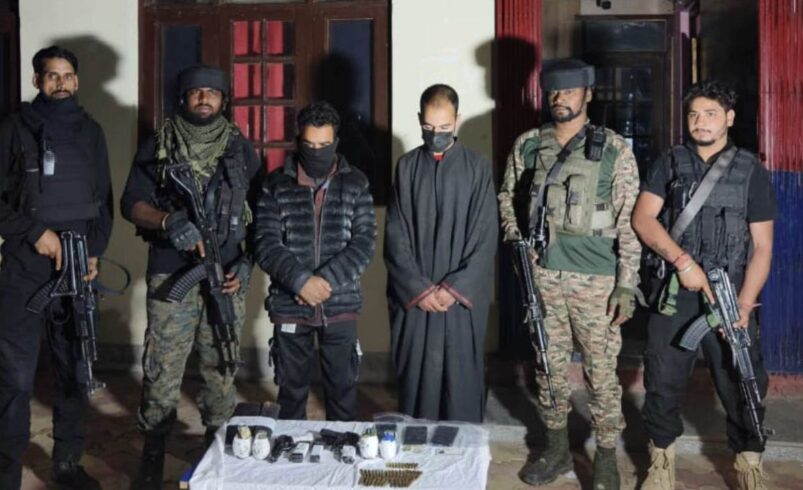In a major breakthrough for security forces in Jammu and Kashmir, two hybrid terrorists were arrested on Thursday in the Shopian district’s Baskuchan Imam Sahib area. Acting on precise intelligence inputs, the Indian Army’s 44 Rashtriya Rifles, the Jammu and Kashmir Police, and the 178 Battalion of the CRPF jointly conducted the operation, recovering a significant cache of arms and ammunition. Among the weapons seized were two 56 rifles, four AK magazines, 102 rounds of AK ammunition, and two hand grenades. The arrest marks a critical development in the ongoing efforts to prevent further terror activities and highlights the growing role of hybrid terrorists—individuals who blend into civilian populations until activated for terror missions.
Crackdown Follows Aftermath of Pahalgam Tragedy
The recent arrests are part of a sweeping counter-terrorism campaign initiated after the horrifying April 22 Pahalgam attack, where Pakistan-backed Lashkar-e-Taiba (LeT) terrorists massacred 26 innocent people, including 25 tourists and one local pony owner. The terrorists deliberately segregated civilians based on religion before executing them, an act that shook the entire nation. One of the victims, Syed Adil Hussain, attempted to confront the terrorists, arguing that no religion sanctions such violence—only to be gunned down in cold blood. This brutal event has reignited national outrage and pushed the government to intensify anti-terror operations across the region.
India Responds with Precision Strikes on Terror Bases
In a swift and powerful retaliation, Indian armed forces carried out targeted precision strikes on terror hubs across Pakistan-occupied Kashmir (PoK) and parts of Pakistan. High-value terror infrastructure in Muridke near Lahore, Bahawalpur, and areas like Kotli and Muzaffarabad in PoK were strategically neutralized. These surgical responses were aimed at dismantling operational networks responsible for orchestrating attacks on Indian soil. The strikes were not only symbolic but strategic, targeting the command and control centres of known terror outfits that pose a continued threat to national security and public safety.
Pakistan Retaliates With Civilian Shelling, Escalating Tensions
Following the Indian strikes, Pakistan responded with indiscriminate heavy mortar shelling across several districts of Jammu and Kashmir, including Poonch, Rajouri, Baramulla, Kupwara, and Bandipora. The attacks led to the tragic loss of 28 civilian lives, with Poonch district bearing the brunt—13 civilians were killed there alone. Homes, schools, and basic infrastructure were heavily damaged, leading to widespread displacement and fear among local populations. This cycle of provocation and retaliation has deepened tensions in the border regions and underscores the fragile security situation in the Valley.
Union Government Vows Relentless Action Against Terror
During a high-level security visit to Kashmir on April 23, Union Home Minister Amit Shah delivered a strong message to the armed forces, Central Armed Police Forces (CAPFs), and local police units. He directed them to intensify intelligence gathering, operational coordination, and on-ground action to ensure all perpetrators of the Pahalgam massacre are brought to justice. The arrests in Shopian are just the beginning of a larger, nation-backed mission to root out terrorism from Indian territory. With hybrid terrorism emerging as a new challenge, security forces are now recalibrating their strategies to stay ahead of these covert operatives while ensuring minimal civilian disruption.
Get the latest in business, markets, startups, and policy—visit businessnewsindia.in for in-depth updates and follow us on Instagram @businessnewsindia.in for daily bites of what matters most.
Source : ndtv.com









